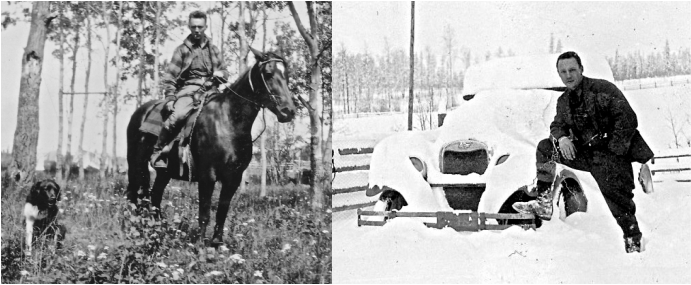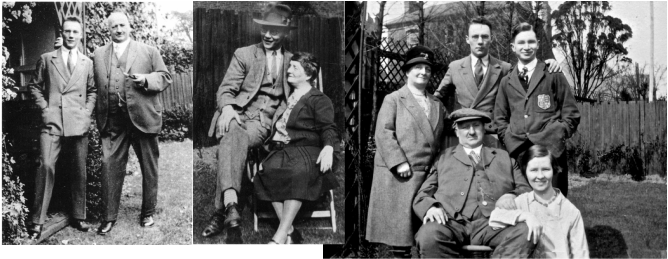CL Botham, Adventurer - Preface

Left: Charles, riding his horse, Daisy, with Mac, his black spaniel to the left.
Right: This fellow from England, facing up to a good Canadian snowfall - and finding that it must be shovelled, be driven in!! - and lived with!!
Charles Lucas Botham, born just after the beginning of the twentieth century, lived through the first two-thirds of that century. During his life he saw and heard of many events which proved to be modern milestones. These not only included the first flight by heavier than air craft, and their development and use in war and peace, the widespread use of gasoline engines to enable personal and commercial transportation, the replacement of locomotives powered by steam by those with diesel engines of much higher capacity, the advent of very large ocean-going vessels with their high capacity for transporting cargoes or passengers, and the development of these and other vehicles with their effects on the development of modern civilization for both good and ill. He saw the massive armies of the great powers twice struggle for mastery of the world at great cost in human lives and national treasure, He struggled and coped with the hardships of the Great Depression, and saw many personal tragedies which were directly attributable to that economic and social disaster. He witnessed the birth, spread, and wide use of radios, telephones, and radio-telephony, the development and wide use of television, and the advent of manned vehicles into their Earth orbits. He saw the development and wide-spread application of plastics, and many other scientific developments. He lived through what was certainly a pivotal period in human history.
Charles’ early home life had provided him with comfort and security. Born in the Midlands of England, he emigrated to Canada right at the beginning of the Great Depression. Prompting this move were great plans, which, with a reasonable amount of hard work and normal entrepreneurial dedication, should have enabled him to earn a comfortable living. However, six weeks after his arrival, and, as he had no source of world or even national news, probably unknown to him for a considerable time, the first crash occurred on the world stock markets. Then as the economic climate steadily worsened, the possibilities for the success of his business steadily declined. The prices of commodities, as well as the market value of companies plunged, and as the supply of money in the country dried up, the efforts of many small businessmen netted dwindling returns. As a result, Charles had to abandon his plans and struggle to survive by working at a variety of short term employments.
In this period, when Charles was forced to find employment with the neighbouring ranchers, exploration companies, the forest service, and others, he came to know and respect the pioneering people of the Ootsa Lake district. In this process he not only gained their respect but acquired a deep appreciation for the natural dignity and humanity of the people of the villages and rural areas in that part of B.C. By the end of three years he had become employed by the Forest Service, if only on a part-time basis, married after five years, and two years after the onset of war in Europe (which grew to be WWII), had joined Canada’s air force as a commissioned officer.
Following the war, Charles returned to the B.C.Forest Service, where circumstances soon arose which he felt portended a dire future if he stayed with that service. To avoid being discarded for a lack of a formal training in forest management, he felt he must leave to ensure that he could retain the capability to support his family. As an alternative occupation he bought a small store in Hazelton, which, after a few years of relative success, he was forced by deteriorating health to sell. Fortunately he was able to return to the Forest Service. However, due to the progressive nature of his illness he was eventually forced to retire when he was still relatively young. He died in Victoria at the age of 59.
Charles’ early home life had provided him with comfort and security. Born in the Midlands of England, he emigrated to Canada right at the beginning of the Great Depression. Prompting this move were great plans, which, with a reasonable amount of hard work and normal entrepreneurial dedication, should have enabled him to earn a comfortable living. However, six weeks after his arrival, and, as he had no source of world or even national news, probably unknown to him for a considerable time, the first crash occurred on the world stock markets. Then as the economic climate steadily worsened, the possibilities for the success of his business steadily declined. The prices of commodities, as well as the market value of companies plunged, and as the supply of money in the country dried up, the efforts of many small businessmen netted dwindling returns. As a result, Charles had to abandon his plans and struggle to survive by working at a variety of short term employments.
In this period, when Charles was forced to find employment with the neighbouring ranchers, exploration companies, the forest service, and others, he came to know and respect the pioneering people of the Ootsa Lake district. In this process he not only gained their respect but acquired a deep appreciation for the natural dignity and humanity of the people of the villages and rural areas in that part of B.C. By the end of three years he had become employed by the Forest Service, if only on a part-time basis, married after five years, and two years after the onset of war in Europe (which grew to be WWII), had joined Canada’s air force as a commissioned officer.
Following the war, Charles returned to the B.C.Forest Service, where circumstances soon arose which he felt portended a dire future if he stayed with that service. To avoid being discarded for a lack of a formal training in forest management, he felt he must leave to ensure that he could retain the capability to support his family. As an alternative occupation he bought a small store in Hazelton, which, after a few years of relative success, he was forced by deteriorating health to sell. Fortunately he was able to return to the Forest Service. However, due to the progressive nature of his illness he was eventually forced to retire when he was still relatively young. He died in Victoria at the age of 59.

